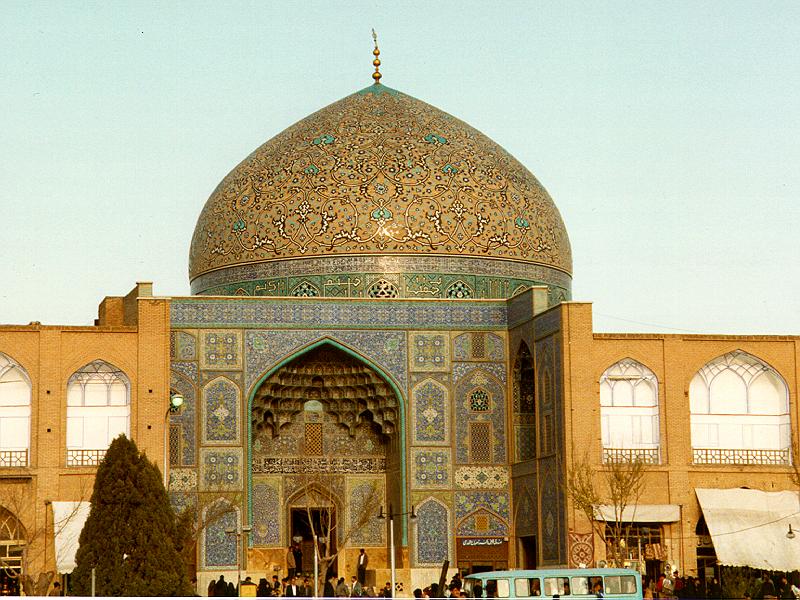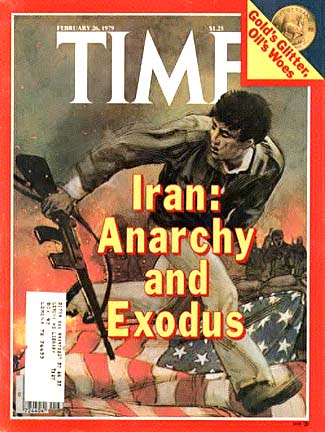Core Culture Iran, 185 A & B |
 |
Picture of the Shaykh Lutfullah Mosque in Isfahan, Iran. |
Core Culture Iran, 185 A & B |
 |
Picture of the Shaykh Lutfullah Mosque in Isfahan, Iran. |
Instructor: Omid Safi (osafi@mail.colgate.edu) Core 185 A: 209 Alumni, 8:30 to 9:45
Core 185 B: 209 Alumni, 9:55 to 11:10.
Office Hours:
Office: 110 Hascall Hall; phone number: 228-7690
Office Hours:: T/Th 11:15 to 12, or by appointment
 |
Conflicting Images of Iran: Iran is home to one of the oldest civilizations in the world, going back well over 3500 years. The Euro-American world tends to associate two conflicting sets of images with Iran: Iran, the home of the Islamic Republic, is associated with the American hostage crisis, Islamic fundamentalism, Shi'i terrorists, and revolution. Persia (the old English name for Iran) is imagined as mysterious and exotic: home of sublime poetry, haunting music, the quintessential land of "the Rose and the Nightingale." Both of these constructions further the notions of Iran/Persia as a "wholly other" civilization, representing everything that "we" are not: radical, religious, mystical, poetical, etc. Studying the Persian culture (and studying the very way in which the Persian culture has been studied) provides us with an opportunity to examine some of our own silent, semi-articulated "privileged" constructions of the Western identity. Our conceptions and constructions of Iran are contradictory and continuously changing. This class seeks to explore various aspects of the Persian culture of Iran in a multi-disciplinary approach. It will offer an overview of the significant events in Iranian history, including the turmoil of the past 25 years. At the same time, other aspects of the Persian culture such as music, poetry, architecture, philosophical thought, the recently avant-garde Iranian cinema, and mysticism will also be covered. |
 |
Grade to be based on: This is not a class for passive listeners. Almost every day we will be analyzing and discussing the readings and web pages. Our aim is to decipher their rhetoric, and understand their argument vis-à-vis other positions. It will be impossible for you to participate in the discussions if you have not done the readings before coming to class. This will hurt your class participation grade. The assignments are due on the days which have been identified, and turning them in late will lead to a deduction in your grade. Breakdown of Grades:
|
Course Description:
In studying the Persian cultural realm, one is struck immediately by a bifurcation of images: at one pole, there is the confluence of images around the idea of a mystical, exotic, sentimental, poetic, and romantic world of "Persia." At the other pole, around that of "Iran", are the images of a radical, extremist, "traditional", fundamentalist regime vehemently opposed to "Progress", "modernity", and "the West."
The late Ayatollah Khomeini declared the West to be the "Great Satan", the very antithesis of all that is good, religious, sanctified by God. If that characterization seems rash or uncalled for (not to mention offensive), it is important to recall the complementary Western characterizations of Iran as the Ultimate "Other" civilization which runs counter to the ideals of progress, democracy, and human rights (and probably baseball, apple pie, motherhood, etc.). These characterizations (both journalistic and scholarly) in a sense mirror Khomeini’s denouncement of the West in that they both attempt to demonize an "Other" to help define and solidify a constructed "self."
A goal of this class is to explore the multifaceted experience of the Persian (and Persianate) peoples in a multi-disciplinary fashion. Given the recent associations of Iran with a "religious regime", it is important to emphasize that religion will certainly be one lens through which we will approach, experience, analyze, and reflect on Iran.
However, even when "religion" will be used as a category of analysis, we are less concerned with discussing it as a "system of beliefs" and more with the various ways in which it can serve as a rhetorical language for ideological movements. Even with the importance of religion in both Iranian self-perceptions and Euro-American constructions/projections, it will not be the only mode of analysis for us: we will utilize approaches from history, political science, art history, literature, economics, and sociology in our study of the Iranian culture. This is not primarily a religion class, nor a literature, nor a history one. Our aim is to utilize various disciplines to study many different aspects of a complex culture.
The topics will include (but not be limited to): the Pre-Islamic background of Iran, the emergence of an Persianate Islamic civilization, the constructions of Iranian identity as distinct from a central Asian and an Arab one, the importance of Shi’i and Sufi (mystical) understandings of Islam, and the emergence of the Iranian (a.k.a. Islamic) revolution of 1979, along with competing contemporary attempts to chart the future of the country. Our aim is not to identify the "real" Iranian character (as if there were such a thing, or any one such thing), but to identify the competing attempts to construct a normative Iranian identity.
To appreciate Iranian aesthetic, we will view two modern Iranian films shown as part of the Asian Film Festival, and attend a concert. Attendance at these events is mandatory, and you will be asked to submit analysis of these events.
Important Dates
A note on "Talking points" and Class participation:
This course can only be successful if we have daily, active discussions. That will only happen if you have spent time before coming to class pondering over the readings. To aid you in this, you are are asked to bring a focused "talking point" (around 2 pages) to every class. A talking point is a form of dialogue between you and the readings: that is to say, reflections and queries you are prepared to share with a classmate and/or with the instructor. Your daily "talking points" will play a considerable role in shaping the day's discussion. Every talking point must contain 2-3 written questions to be asked in class. The talking points, which will be first exchanged with your colleagues and then gathered by me, count for 30% of your final grade.
I leave it up to you to decide how you will engage the text in your talking point:
*reflect on an idea you found interesting or intriguing in the readings,
*discuss who the various readings complement or differ from one another,
*explore the implications of a particular idea,
*compare to another work we've studied,
*trace how the work speaks to a theme we encountered earlier.
Required texts
The web-sites identified in the syllabus are not "optional" browsing: I expect you to spend as much time "surfing" them–and analyzing them–as you would a traditional print medium. We will be discussing the web pages in class as well.
The Course-Pac [CP]
The CP is to be purchased in the class.
Click here to see:
Schedule of Classes & Reading Assignments